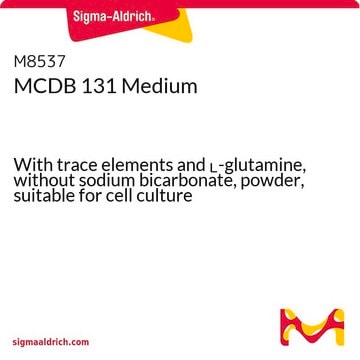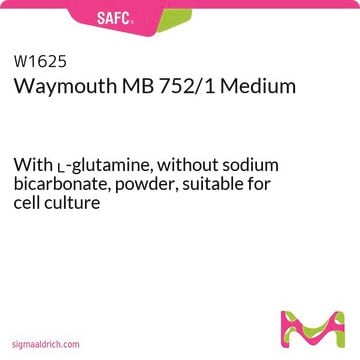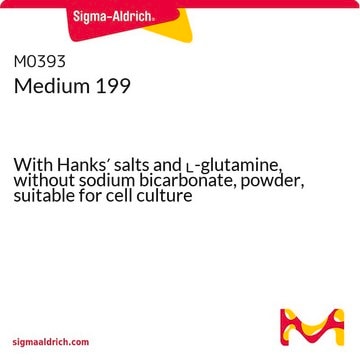M6395
MCDB 105 Medium
With trace elements, L-glutamine and 25mM HEPES, powder, suitable for cell culture
Synonym(s):
Molecular, Cellular, and Development Biology 105 medium
Sign Into View Organizational & Contract Pricing
All Photos(1)
About This Item
UNSPSC Code:
12352207
NACRES:
NA.75
Recommended Products
Quality Level
form
powder
technique(s)
cell culture | mammalian: suitable
components
phenol red: 0.001242 g/L
glucose: 0.72064 g/L (Dextro)
sodium pyruvate: 0.11 g/L
HEPES: 5.958 g/L (25mM)
L-glutamine: 0.3653 g/L
shipped in
ambient
storage temp.
2-8°C
General description
MCDB media has been designed for the low-protein or serum-free growth of specific cell types using hormones, growth factors, trace elements, or low levels of dialyzed fetal bovine serum protein (FBSP). Each MCDB medium is formulated (qualitatively and quantitatively) to provide a defined and optimally balanced nutritional environment that selectively promotes the growth of a specific cell type. MCDB 105 is derived from the modifications done with MCDB 104 medium. This medium is suitable for the long-term growth of WI-38, MRC-5, and other human diploid fibroblast-like cells.
Application
MCDB 105 Medium has been used to culture:
- human umbilical vein endothelial cells
- primary human endometrial stromal cells (ESC)
- ovarian cancer cell line (OVCAR3)
Quantity
Formulated to contain 14.9 grams of powder per liter of medium.
also commonly purchased with this product
Product No.
Description
Pricing
supplement
Product No.
Description
Pricing
Storage Class Code
11 - Combustible Solids
WGK
WGK 1
Flash Point(F)
Not applicable
Flash Point(C)
Not applicable
Certificates of Analysis (COA)
Search for Certificates of Analysis (COA) by entering the products Lot/Batch Number. Lot and Batch Numbers can be found on a product’s label following the words ‘Lot’ or ‘Batch’.
Already Own This Product?
Find documentation for the products that you have recently purchased in the Document Library.
Customers Also Viewed
Bjørn Grinde et al.
Virus research, 123(1), 86-94 (2006-09-26)
Polyomavirus BK-associated nephropathy (PVAN) is an emerging cause of early renal transplant failure. In order to learn more about the cellular response to BK virus, microarrays were used to study its effect on mRNA expression in human endothelial cells. The
Minghai Shao et al.
Nucleic acids research, 39(10), 4035-4047 (2011-01-27)
Platelet derived growth factor (PDGF) regulates gene transcription by binding to specific receptors. PDGF plays a critical role in oncogenesis in brain and other tumors, regulates angiogenesis, and remodels the stroma in physiologic conditions. Here, we show by using microRNA
Jing-Jing Wang et al.
Oncoimmunology, 8(11), e1659092-e1659092 (2019-10-28)
Blockade of the programmed cell death 1(PD-1)/PD-1 ligand-1(PD-L1) pathway has been exploited therapeutically in many cancer types. Upregulation of PD-L1 in tumor cells contributes to malignancy through suppression of the T cell-mediated antitumor response. Pyruvate dehydrogenase kinase 1 (PDK1), a
Jana Kim et al.
Journal of magnetic resonance imaging : JMRI, 47(6), 1589-1600 (2017-12-06)
Steady state susceptibility contrast (SSC)-MRI provides information on vascular morphology but is a rarely used method. To investigate the utility of the ultrasmall superparamagnetic iron oxide particles (USPIOs) GEH121333 for measuring tumor response to bevacizumab and compare this with gadolinium-based
Joseph Massey et al.
Proceedings of the National Academy of Sciences of the United States of America, 116(11), 4989-4998 (2019-03-02)
WNT/β-catenin signaling is crucial to all stages of life. It controls early morphogenetic events in embryos, maintains stem cell niches in adults, and is dysregulated in many types of cancer. Despite its ubiquity, little is known about the dynamics of
Our team of scientists has experience in all areas of research including Life Science, Material Science, Chemical Synthesis, Chromatography, Analytical and many others.
Contact Technical Service

![[D-Trp6]-LH-RH ≥97% (HPLC), powder](/deepweb/assets/sigmaaldrich/product/structures/321/602/34cc2814-2f6f-4fc9-a266-835bfe27bcc5/640/34cc2814-2f6f-4fc9-a266-835bfe27bcc5.png)




